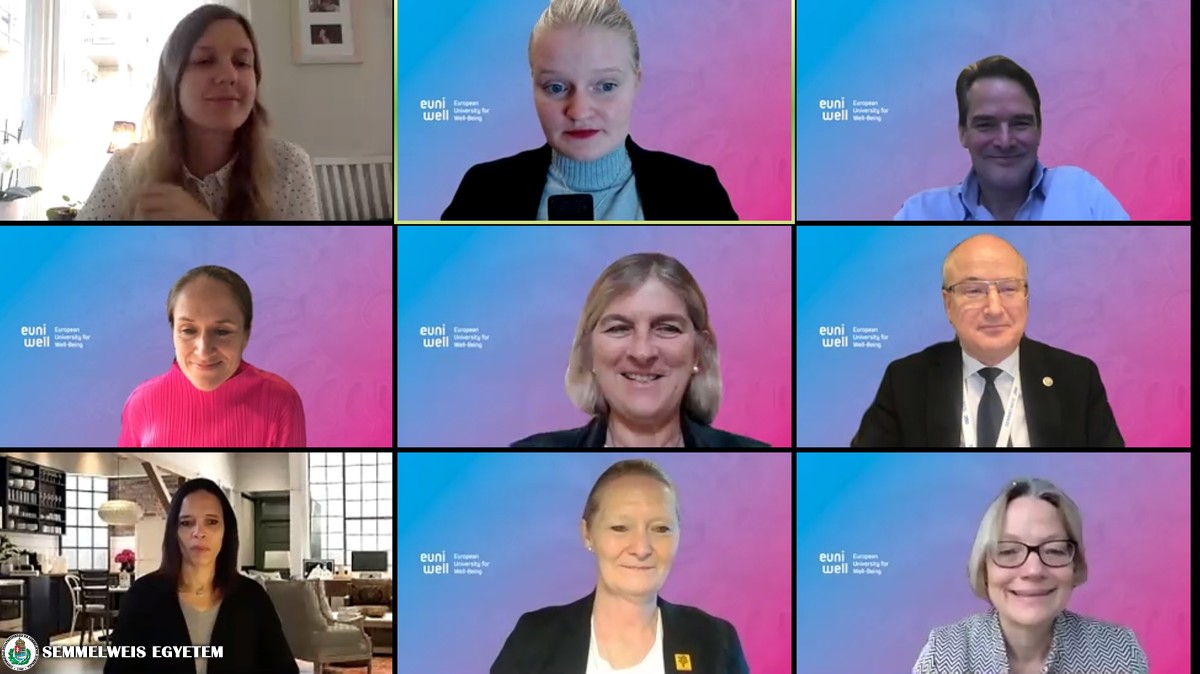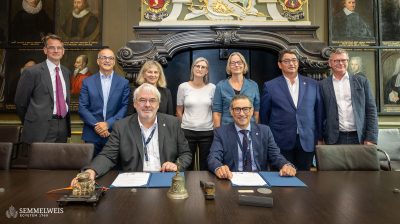EUniWell, the European University for Well-Being was officially launched within the framework of an all-day-long online event. The university alliance brings together seven leading European universities, including Semmelweis University. The alliance opens up a number of new opportunities in education, research, further training and business. The leaders of the universities, including Dr. Béla Merkely, greeted the members of the alliance in video messages and the leaders of the alliance presented the plans of EUniWell in a panel discussion, where Dr. Miklós Kellermayer, Dean of the Faculty of Medicine spoke on behalf of Semmelweis University. EUniWell’s second call for funding was announced that provides collaboration opportunities and funding for the citizens of the member universities.
“European University Alliances will support closer collaboration in research and teaching to respond to some of the biggest challenges of the 21st century.”, said Dr. Béla Merkely, Rector of Semmelweis University in a video broadcast before the start of EUniWell’s online Launch Day event.
he European University of Well-Being (EUniWell) brings together seven universities: Semmelweis University, Leiden University, Linnaeus University, University of Birmingham, University of Cologne, University of Florence, University of Nantes uniting over a quarter of a million students and 36,000 researchers, educators, and staff. The all-day online event enabled the detailed introduction of the project and the wide-ranging opportunities it offers.
The most important information in connection with EUniWell was shared in the panel discussion of the association’s Steering Committee, that was moderated by Judith Barth and Rebecca Esselgren, student representatives from the University of Cologne and Linnaeus University. Dr. Beatrix Busse, Vice-Rector of the University of Cologne introduced the goal of the initiative, which is creating strategic partnerships between the universities to address various societal challenges. Well-being, as an umbrella theme became the universal goal of the association after consultation with university students, researchers and staff. Their mutual goal is to improve people’s well-being in the face of future challenges, while taking the strengths of the member universities into consideration to best channel the synergies.
“The “arenas” we have defined mainly cover health, social and individual well-being, urbanization and environment, which are related to the UN’s Sustainable Development Goals (SDG).”, said Dr. Beatrix Busse.
On behalf of Semmelweis University, Dr. Miklós Kellermayer, Dean of the Faculty of Medicine spoke about the efficient online collaboration and communication among the members of the alliance despite the difficulties caused by the epidemic. The alliance was basically set up in online cooperation supported by a new management model, which is based on the close cooperation between the Steering Committee and the students.
“We at Semmelweis University know very well the power of this effort. Having a truly international student body arriving from more than 70 different countries and curricula taught in three different languages, we are a testimony to the need and benefit of co-creational governance structures.”, Dr. Kellermayer said.
He emphasized the success of the rapid shift towards digitalization caused by the pandemic, which was achieved in case of EUniWell and which at the same time has made the need for health, well-being and the improvement of the quality of life ever more important.
“Being a health- and medicine-oriented community and the intellectual descendants of Ignác Semmelweis, we at Semmelweis University are particularly sensitive to issues related to physical, mental and societal well-being.”, Dr. Kellermayer Miklós pointed out.
Dr. Giorgia Giovannetti, Vice-Rector of the University of Florence spoke about educational development. She talked about EUniWell’s plan to draw the curricula of the member institutions closer together, to launch joint courses and innovative, virtual mobility programmes that is of great importance in the current situation, when physical mobility is hindered by the pandemic.
Dr. Hester Bijl, Vice-Rector at the University of Leiden introduced research opportunities, underlining the strong emphasis on supporting young researchers and involving student in research to a greater extent.
According to Dr. Robin A. Mason, Vice-Chancellor of the University of Birmingham, the students and staff of the universities will have several new opportunities to participate in various courses, trainings, voluntary movements not only at the partner universities, but at EUniWell’s more than 100 partner companies in the private sector.
Dr. Ann-Charlotte Larsson, Deputy Vice-Chancellor of Linnaeus University also emphasized the collaborative opportunities between the 7 universities. Due to the lack of physical mobility, virtual forms will be promoted for the moment, but joint student cards, admission procedures and PhD courses are planned along with a lot of opportunities for collaboration for university staff. In addition, 7-week and 7-month exchanges programmes for students and staff are to be realised.
Dr. Isabelle Richard, Vice-President of the University of Nantes mentioned that the universities plan to draw up common recruitment guidelines and to set up start-up programmes and virtual entrepreneurship programme with the participation of students, staff and researchers to reinforce the entrepreneurial mind-set.
The Student Board of EUniWell was also officially established on the Launch Day. The involvement of students and the integration of student perspective has been of paramount importance in EUniWell from the beginning. 75 students from across all partner institutions contributed to the construction of the project proposal. The Student Board’s mission is to develop, co-create and critically evaluate ideas within EUniWell and to ensure that the student’s voices are reflected in the development of the European University. The student representative of Semmelweis University in the Student Board is Máté Dominik Bíró, 3rd year student of medicine who also responsible for informing Semmelweis students and for coordinaitng the work related to EUniWell at Semmelweis University. During the Launch Day, the participants could follow a live panel discussion on the main tasks of the Board and the importance of student representation, where Sloan Kudrinko, 3rd year dentistry student spoke on behalf of the students of Semmelweis University.
EUniWell’s second call for funding was released at the Launch Day offering collaboration opportunities and funding for the citizens of the member universities. The proposal must be submitted by teachers, researchers, students or administrative staff from at least three universities of the consortium to cooperate in realizing EUniWell’s objectives of well-being. Innovative educational and research projects are given priority, which promote collaboration and knowledge transfer within the consortium. Details on the call for proposals are available here. Proposals can be submitted by 29 January 2021 with the coordination of Semmelweis University’s EUniWell team. The winning projects of the previous call may serve as a basis for the selection of topics.
The last programme of the Launch Day featured a panel discussion with four experts on well-being from an academic perspective. On behalf of Semmelweis University, Dr. Bea Pászthy, associate professor at the 1st Department of Paediatrics talked about the importance of children’s mental health. On the occasion of World Prematurity Day, she drew attention to the fact that children who were delivered extremely early, were about five-six times more likely to have neurodevelopmental disorders such as attention deficit hyperactivity disorder (ADHD), autism spectrum disorders, lower IQ and learning disabilities. She pointed out that being a preemie is a very significant inequality, therefore reducing the percentage of premature birth, promoting healthy pregnancy and parenting can be among the mutual goals of EUniWell.
In her presentation she also mentioned that children with mental disorders are in many cases not diagnosed or diagnosed late, so they receive help late or not at all. Therefore, Dr. Bea Pászthy believes that EUniWell would provide adequate visibility for the importance of early diagnosis and intervention.
One PhD student from each partner university had the opportunity to present their well-being related research during the Launch Day. From Semmelweis University, Imola Sándor, PhD student and psychologist at the Institute of Behavioural Sciences spoke about her extensive experience as a student counsellor of the state and development the mental health of medical students. She is currently writing her PhD thesis on this topic and mentioned that this year a mentor programme was launched at Semmelweis University for students studying in the pre-clinical module.
The introductory videos of all partner universities and other content on the activities of EUniWell were available during the event.
EUniWell is a large-scale European project supported by the European Commission will encourage knowledge transfer and mobility, providing new opportunities for students, lecturers and researchers for personal development and enable universities to meet the global challenges of the 21th century. EUniWell’s mission is to improve the quality of life for European citizens by enabling seamless cross-border learning opportunities for students and promoting interdisciplinary research projects in international collaborations. EUniWell aims to improve the quality of life of European citizens by supporting closer collaboration in research and teaching within the four core Research Arenas including Well-Being and Health, Individual and Social Well-Being, Environment, Urbanity and Well-Being, and Teacher Education.
Tamás Deme;
Zita Dékán, Ágnes Raubinek, Eszter Turopoli – Directorate of International Relations
Photo: Attila Kovács – Semmelweis University
Video source: EUniWell, Semmelweis University’s Directorate of Communication and Events
Translation: Ágnes Raubinek


